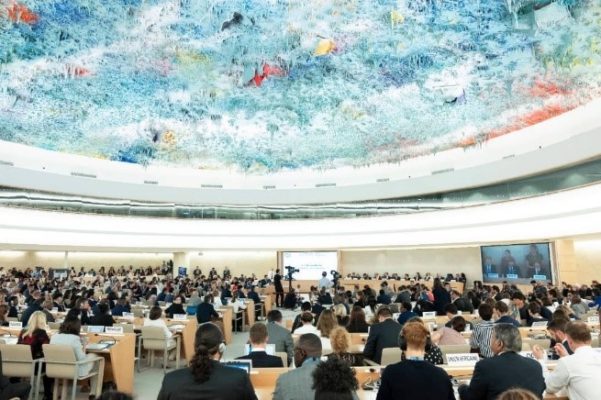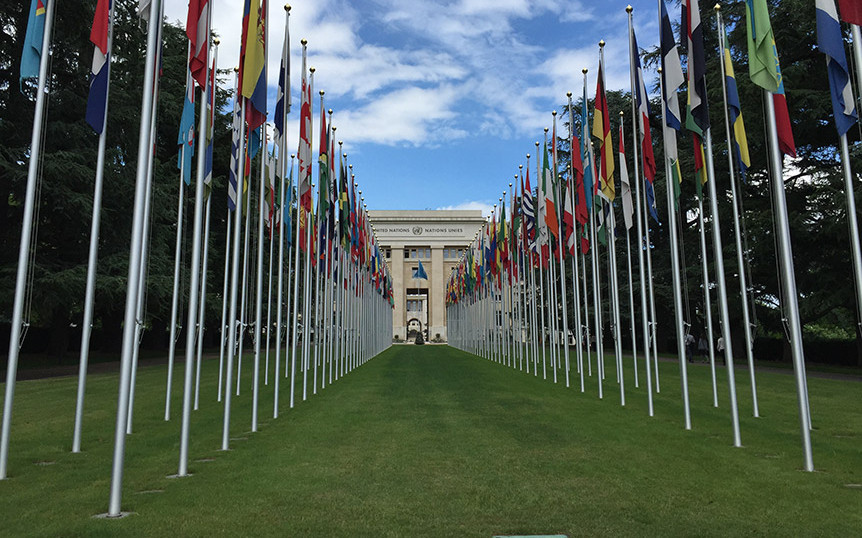
27 February 2019 – Today Bahrain’s Assistant Foreign Minister, Abdulla Faisal Al-Doseri, addressed the 40th session of the United Nations Human Rights Council (HRC), offering misleading remarks on Bahrain’s progress on human rights issues within the kingdom. Al-Doseri discussed Bahrain’s efforts to promote “peace and stability,” the efforts of the kingdom’s nominal accountability mechanisms, the National Institution for Human Rights (NIHR) and Prisoners and Detainees Rights Commission (PDRC), its parliamentary elections, and desire for spreading its experience concerning human rights around the world.
However, Al-Doseri’s remarks do not accurately describe the situation in Bahrain. While the government claims to have a strong human rights record and claims to promote and protect human rights, authorities use the kingdom’s broad and vague anti-terrorism statutes to arrest, detain, torture, and imprison peaceful critics, political activists, and human rights defenders under the guise of fighting terrorism and ensuring national security. The government also uses citizenship revocation as a tool against dissidents, denaturalizing hundreds on the basis of their criticism of authorities while targeting activists because of their engagement with international human rights mechanisms in acts of reprisals. Americans for Democracy & Human Rights in Bahrain condemns the Government of Bahrain’s speech and calls on Bahrain to take serious steps to protect and promote human rights, including through holding rights abuses accountable, and bringing its national laws into line with international human rights standards.
In his remarks, the Assistant Foreign Minister highlighted Bahrain’s role in countering terrorism and working to promote human rights, security, and stability. However, the government has passed broad and vague laws that allow officials to target and imprison anyone seen as being critical of the government or ruling family, including the counter-terror law and anti-cybercrime law. Under the counter-terror law, authorities have imprisoned hundreds of activists, dissidents, political activists, and human rights defenders. Among those targeted for spurious terror charges are human rights defender Abdulhadi al-Khawaja, a leader of the pro-democracy movement in 2011, prominent human rights defender Nabeel Rajab, torture victims Abbas al-Samea, Sami Mushaima, and Ali al-Singace, who were executed in January 2017, Husain Ali Moosa and Mohamed Ramadan, who are at risk of execution despite international concern, as well as Abduljalil al-Singace, Abdulwahab Hussain, and Hassan Mushaima, political opposition leaders who are currently serving life sentences in prison. Under the anti-cybercrime law, officials have imprisoned human rights defenders like Nabeel Rajab, and targeted bloggers and journalists.
Even as the Bahraini government uses its counter-terror and anti-cybercrime laws to target dissidents, it has used administrative means to denaturalize critics of the government, thereby depriving them and their dependents of government-provided social services. In 2018 alone, the government revoked the citizenship of approximately 304 people and the kingdom continues to denaturalize individuals under the pretext of fighting terrorism. Since 2012, the government has revoked the citizenship of over 800 people.
In his remarks, the Assistant Foreign Minister noted Bahrain’s election to the Human Rights Council and his country’s interest in working with the Human Rights Council to promote human rights. Bahrain was elected to the Council on a “blank slate” – running unopposed. Despite the kingdom’s election to the Council and stated interest in cooperating with the Council, the Bahraini government has refused to substantively cooperate with the United Nations’ human rights mechanisms. The government has not allowed a visit from the Special Procedures since 2006 and has not allowed a visit by the Office of the High Commissioner for the past several years. Nor has the government implemented the majority of its substantive Universal Periodic Review recommendations.
Moreover, the government has targeted activists who have engaged our sought to engage with the United Nations or other international bodies and mechanisms. After she attended the Human Rights Council, the government arrested and interrogated activist Ebtisam al-Saegh. Security force personnel tortured and abused her physically, psychologically, and sexually. The government also targeted the family of London-based activist Sayed Ahmed Alwadaei for his activism, including at the United Nations Human Rights Council. Officials arrested his mother-in-law Hajer Mansoor, his brother-in-law Sayed Nazar Alwadaei, and his cousin Mahmood Marzooq Mansoor, who live in Bahrain. Security forces tortured Sayed Nazar and Mahmood Mansoor, forcing them to confess to spurious terror-related charges. Authorities also abused Hajer Mansoor before charging her with planting a fake bomb. In prison, security forces have continued to target her, including assaulting and beating her. In addition to targeting Sayed Alwadaei’s family in Bahrain, officials sentenced his wife Duaa Alwadaei in absentia to two months in prison.
Al-Doseri also raised Bahrain’s nominal human rights investigation bodies, the National Institution for Human Rights (NIHR) and the Prisoners and Detainees Rights Commission (PDRC). Despite his praise, neither the NIHR nor the PDRC have the mandate to independently and impartially investigate allegations or rights abuses by security forces or to do more than offer minimal support to prisoners. Rather, the NIHR has played a role in whitewashing rights abuses by security forces personnel. Its annual reports have overlooked many of the kingdom’s abuses, including the 2017 police raids on Diraz, where the report omits any mention of injuries and deaths from the raids. The NIHR additionally failed to criticize officials’ abuse of Hajer Mansoor, Najah Yusuf and Medina Ali, instead releasing a statement deeming the beatings “within reasonable use of force.” In January 2017, the NIHR endorsed the execution of three men subjected to torture, describing it as “in accordance with recognized international standards,” in direct contradiction to assessments from UN experts and international human rights organizations.
Throughout his remarks, Al-Dosari referenced the kingdom’s elections for the lower house of parliament, citing this as a positive aspect of Bahrain’s intention of empowering its citizens and of implementing reforms. However, while we had hoped that the elections could be an opportunity to ease tensions with the political opposition, the government instead doubled down on repression, and as a result, the elections were neither free nor fair. The elections occurred in an environment of increased restrictions on political opposition societies and members and in the absence of independent media. The government effectively banned the political opposition from fully participating in the elections, having dissolved all major opposition political societies and prohibiting anyone who had belonged to one of these political groups from seeking office. Furthermore, only two weeks ahead of the elections, Bahrain’s Court of Cassation sentenced Sheikh Ali Salman, the leader of Al Wefaq – the largest political opposition society – to life in prison.
Throughout his remarks the Assistant Foreign Minister attempted to describe Bahrain’s fidelity to international human rights standards and principles. His speech does not, however, accurately describe the situation in the country, as the government continues to repress fundamental human rights. We strongly condemn the Assistant Foreign Minister’s remarks and urge the international community to pressure Bahrain to bring its domestic laws and statutes into compliance with international human rights treaties and standards. This is especially important now that Bahrain is a Member State on the Human Rights Council, and thus empowered to vote on, and pass, resolutions concerning human rights around the world.





